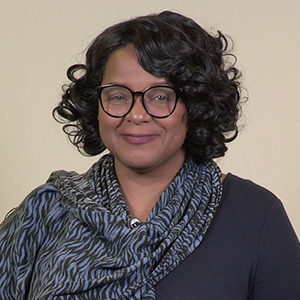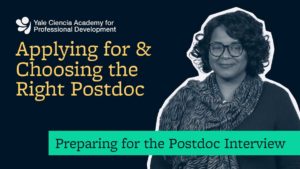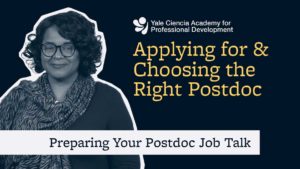Talk Overview
After receiving an invitation to interview from your prospective postdoc lab (or other employer) you need to develop an interview game plan. Your ultimate goal is to demonstrate why you are a good fit for the position. A postdoc interview usually includes meeting and talking with the principal investigator and members of your prospective lab. In this session, you will learn how to strategically highlight your strengths during the interview process and prepare a postdoc job talk that is relevant to your audience and outlines how you will contribute as a scholar and potential colleague.
Session Narrative
After all the effort you put into your CV and cover letter, receiving an interview invitation can feel exciting and validating. It is also normal to feel nervous about interviewing, but it helps to start thinking about what to expect and how to prepare. For academic postdoc positions, this process is typically composed of two major parts: the interview itself and the job talk. The main goal of the interview process is to help your prospective Principal Investigator (PI) and you make an informed decision about whether you are a good fit for the lab and if they provide the right postdoc opportunity for you. That’s why creating a good game plan for the postdoc interview and job talk is critical.
Preparing for the Interview: Good Fit and Good Candidate
Let’s explore three critical areas that will help you prepare for your interview: (1) goals, (2) strategies, and (3) structure.
First, remember that both you and the interviewer will have different and specific goals in mind. Your interviewer wants to verify your experiences, decide if you are a good fit for the lab, and potentially convince you to join. As the interviewee, you’re aiming to demonstrate how you can contribute to the lab, assess whether this postdoc opportunity can fulfill your goals, and reflect on whether this is a place you want to work. Keeping this in mind, your interview strategy should be designed to achieve all three of these.
As you prepare for the interview, you should determine what you want them to know about you and what you want to learn about them. Write these down on a piece of paper, and keep them close as you continue planning your interview strategy. Next, you can research common postdoc interview questions (see Resource Section) to get a better idea of what the interviewer is trying to assess. You should approach each question as an opportunity to share what you want them to know about you. Your answers should demonstrate why you are a competitive candidate for that position and a good fit for the team. Thus, a successful interview strategy allows you to provide the interviewer with as much relevant information about you as possible.
Of course, the interview process is also an opportunity for you to ask questions. You may not have enough time to ask all of your questions, so you should prepare a list of the top 2 to 3 questions that you’d like to ask. If you don’t get to ask all of your questions during the interview, you can ask them via email or request a brief follow-up call.
Finally, keep in mind that whether the interview structure is casual or more formal, the goals for both you and your interviewer remain the same: assess whether you are a good candidate and if this opportunity is a good fit.
Preparing for the Job Talk: Know Your Audience
It’s common for research advisors to ask you to give a job talk during your interview. To create a great job talk you have to consider your audience (for additional advice and resources to help you do this, check out the Share Your Research: How to Give a Good Talk course). Will your audience be familiar with your research or will your work be new to them? How much emphasis should you place on the techniques? How does your proposed research fit into the overall work of the lab? Answering these types of questions will help you understand your audience and increase the relevance and impact of your job talk.
Typically, there are two types of postdoc job talks and the one that you choose depends on whether you want to stay in your PhD research area (i.e., the continuation talk) or apply your skills in a different field (i.e., the pivot talk). Both talks should address how you can contribute to the overall mission of the research team; this requires a good understanding of the research environment you are applying to.
The Continuation Talk is for candidates who want to continue to do research on topics related to their PhD training. Because the audience is more likely to be familiar with your work or at least your area of research, they will not need as much background to understand what you did and why it matters and you may be able to go into greater depth into your experiments and techniques.
The Pivot Talk is for candidates who want to transition into a different research area. The audience is less familiar with your work or research area, so you’ll need to provide sufficient background for them to understand the significance and context of the problem and you may need to give less experimental details. For this type of talk, make sure you convey why you want to pivot into a new research field.
Whether you stay in your field or choose to venture out (i.e., you give a continuation or pivot talk), a successful postdoc job talk should demonstrate three things: 1) that you developed a body of knowledge during your PhD that can be applied during your postdoc; 2) that you have a clear vision of your future goals and specific reasons why the lab is a good fit; and 3) that you can work independently. Knowledge, vision, and independence are evidence of a productive PhD experience and indicators of a promising postdoc career.
Finally, your overall game plan should include practice! There are many ways you can practice for your interview and postdoc job talk. You can perform mock interviews with mentors from your circle of support and/or professional development experts at your institution. You can also practice with your advisor and lab mates and attend job talks on your campus. Practicing your postdoc job talk will help you refine what you want to communicate and increase both your confidence and conviction as you execute your game plan. Remember, practice makes better!
Activities (Exercises and Self-Reflection):
- Activity 3.1: Postdoc Interview ‘Show and Tell’
- Activity 3.2: Getting Feedback on Your Practice Talk
- Activity 3.3 (Optional): Share Your Research: How to Give a Good Talk a course by the Science Communication Lab
Speaker Bio
Naledi Saul

Naledi Saul is the Director of Career and Professional Development at the University of California, San Francisco (UCSF). She holds a Master’s of Public Management degree from the University of Maryland, College Park, and a Bachelor of Arts in History from Spelman College. Prior to UCSF, Naledi was an Assistant Dean of Students and Assistant… Continue Reading







Leave a Reply